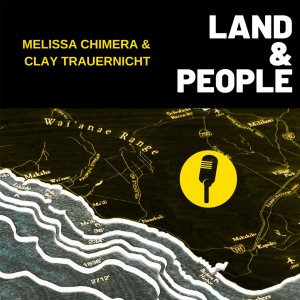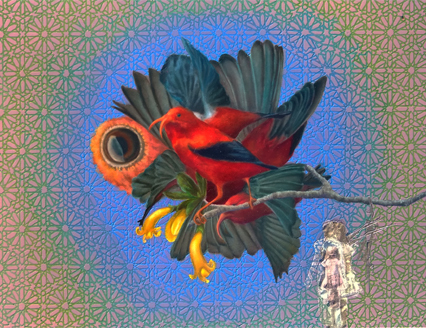Land and People
Hawai`i conservationist and artist Melissa Chimera and University of Hawai`i Mānoa fire and ecosystems scientist Dr. Clay Trauernicht talk with land protectors in Hawai`i and the Pacific about the places they cherish through their professional and ancestral ties. We paint an intimate portrait of today’s land stewards dealing with global crises while problem solving at the local level. Brought to you by the Cooperative Extension Program at the University of Hawai`i at Mānoa’s College of Tropical Agriculture and Human Resources. Music ”Raindrops” courtesy Lobo Loco and ”Bale Wengei” courtesy Joshua Rostron.
Episodes

Friday Feb 16, 2024
Friday Feb 16, 2024
Hannah Kihalani Springer of Hawai`i Island is a storyteller, environmental activist, and scholar of Hawaiian history for many decades. As a former trustee for the Office of Hawaiian Affairs and advocate for land and sea conservation, she has headed up the nonprofit `Ahahui o Pu`u Wa`awa`a which advocates for the conservation and management of forest systems including endangered Hawaiian plants. Her perspective and that of her husband retired fire fighter Michael Tomich is one of hybridity--in their support for ranching and sheep herding in fire prone grasslands while at the same time restoring native species. She brings us the mo`olelo (place based stories) of Kaʻūpūlehu which demonstrate how we might bring a holistic and reverent relationship to `āina (land) based in aloha kekahi i kekahi (love for one another).

Friday Feb 02, 2024
Friday Feb 02, 2024
Emily and Ann Fielding, the mother-daughter marine duo of Maui have both lived and worked in Hawai`i to help educate and conserve the ocean, its creatures, coral reefs across the Pacific. Ann's experience is as an underwater naturalist where she introduced visitors, kama`aina and students to the abundance of Maui's coral reefs and their creatures. Emily has worked in many capacities from helping to protect one of the largest marine protected areas in the world--Papahānaumokuākea--to conserving the marine life of the Hawaiian archipelago as The Nature Conservancy's Hawai`i Marine Conservation Director. Together they bring us a vision of what real and lasting ocean sustainability might mean for both people and the environment, based on their many decades bridging education, science and culture via community-based management.

Friday Jan 19, 2024
Friday Jan 19, 2024
For nearly four decades, Department of Land and Natural Resources aquatic biologist Skippy Hau has been in and out of Maui's oceans, estuaries and streams surveying for Hawaiian fish, shrimp, snails, corals, limu (seeweed) and nearly every living thing he could observe underwater. Growing up as a fisherman's son in Kaneohe, O`ahu, Skippy's love of the sea and streams extends to his on-going survey work, research projects, and his students. He paints the picture of his team's painstaking biology which advocates that diverted water be returned to streams, not only for the benefit of both fresh and salt water creatures but also for traditional Hawaiian subsistence farming.

Friday Jan 05, 2024
Friday Jan 05, 2024
We bring together the family and colleagues of Dr. Lloyd Loope, Maui research biologist and ecologist based at Haleakalā National Park who passed away in 2017. We reflect on his legacy as the cornerstone for Hawaiian invasive species management as we know it today and mentor for so many in island ecosystem conservation. Pat Bily of The Nature Conservancy, Teya Penniman of the Maui Invasive Species Committee, Chuck Chimera of the Hawai`i Invasive Species Council and Lloyd's daughter Brook and son Marshall speak to his unmatched intellect and laser focus, his grace and humility, and above all, his extraordinary dedication and foresight in recognizing the importance of research and conservation across boundaries.

Friday Dec 22, 2023
Friday Dec 22, 2023
Keahi Bustamente is the field coordinator for the Maui Nui Snail Extinction Prevention Program. He works across three islands--Maui, Moloka`i and Lāna`i--searching sometimes all day in the steepest, most remote mountains for a single individual. He speaks candidly about the logistical, physical and knowledge challenges in this work as well as the gift his mentors have given him in showing him the species and places most will never see. His kuleana is that of husband, father and professional mentor to others, while recognizing that this essential knowledge is likewise passed down to the next up and coming conservationists.

Friday Dec 08, 2023
Friday Dec 08, 2023
In this episode, co-host Melissa Chimera brings together stories of women in the field from Kerri Fay, terrestrial program manager with The Nature Conservancy and Ane Bakutis, Moloka`i coordinator for the Plant Extinction Prevention Program. Together they share their perspectives as women working in physically demanding jobs across remote locations, managing the logistical and interpersonal complexities of people and land, while simultaneously raising children and advocating for malama `āina in their communities and respective places. They share an honest reflection on the female perspective of those in mid-career conservation, specifically the challenges and opportunities of the past twenty five years, as well as insight into what needs to happen next in terrestrial land conservation.

Friday Nov 24, 2023
Friday Nov 24, 2023
Hawaiian land and water activist Ke`eaumoku Kapu of West Maui is descended from a long line of kalo (taro) farmers and care takers of his ancestral home in Kauaula. He and his family's hard won land-back struggles and stream water repatriation in the face of powerful corporate interests serve as the backdrop of his current efforts to help his community in the aftermath and the re-build of Lāhaina town which was completely burned to the ground in August 2023. He not only speaks to the difficulties ahead and long road to recovery, but also paints a vision of Moku`ula and the thriving fishing, agricultural and historical village Lāhaina might become in the future.

Friday Nov 10, 2023
Friday Nov 10, 2023
Hank Oppenheimer is a field botanist in Hawai`i for more than 30 years, re-discovering plants thought to be extinct and finding species new to science. He is the Maui Nui coordinator for the Plant Extinction Prevention Program which aims to find, stabilize and help recover the rarest of the rarest Hawaiian plants. Hank has also been witness to significant fires--not only the Lāhaina catastrophe of August 2023--but other fires impacting communities and ecosystems that up until recently escaped the public's attention. We talk candidly about the hardships he and others experience in Maui Komohana (West Maui) and what the long road to recovery might look like now and in the future.

Friday Oct 27, 2023
Friday Oct 27, 2023
Dr. Chris Schuler, a researcher with the University of Hawai`i at Mānoa’s Water Research Resources Center is a hydrologist and ground water modeler who experienced first hand the impacts of wildfire on Maui in 2023 where he and his family live. In his work which spans from American Samoa to Hawai`i, he speaks to the importance of applied environmental research serving communities directly. In his work and that of his collaborators, he helps test for potential pollutants most importantly in drinking water, which underscores how science can give agency to affected people and places experiencing incomprehensible tragedies in real time.

Friday Oct 13, 2023
Friday Oct 13, 2023
Since 1991, Hawai`i water and environmental policy and planning expert Dr. Jonathan Likeke Scheuer has helped people seek a shared, sustainable prosperity for the communities and `āina involved, including the Department of Hawaiian Home Lands, the Hawai`i State Land Use Commission, the Hawai`i Land Trust Board, and the O`ahu Island Burial Council. In the aftermath of the August 2023 wildfires on Maui, Melissa and Clay talk with Jonathan about the 2021 book he co-authored with Bianca Isaki WATER AND POWER IN WEST MAUI. We come to understand how water in Hawai`i is inextricably tied to the transformation of land, an on-going legacy we are living with today.

What Would You Do to Protect the Places You Love?
Land and People asks protectors of our vanishing, native places what they do every day to protect the places they love. We explore the common bonds and different approaches in our intimate portraits with the people of Hawai`i and the Pacific.






